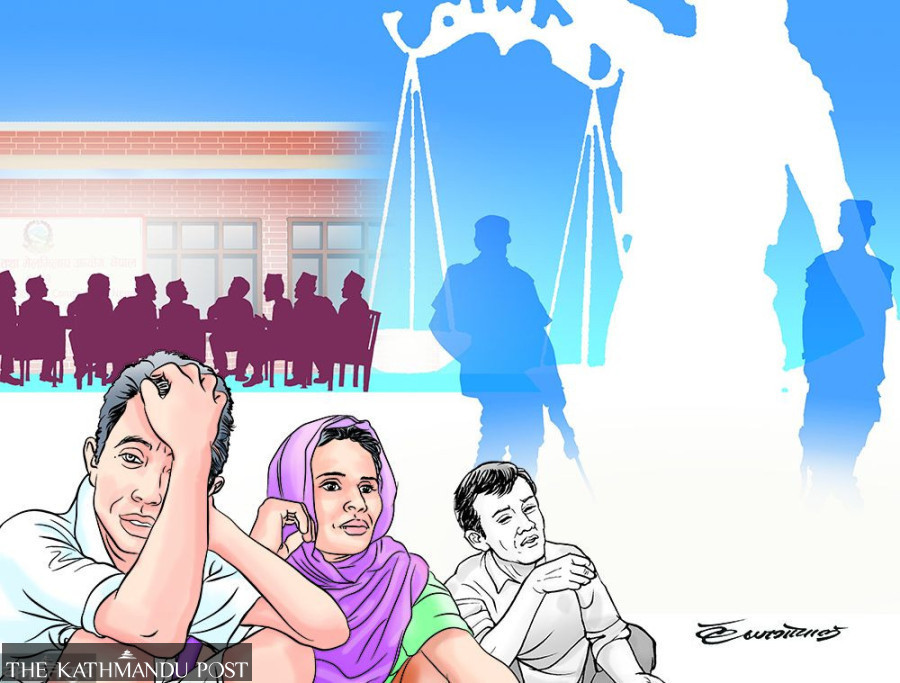National
Three-party taskforce ‘near deal’ on transitional justice law amendments
Activists, victims decry reduced sentencing citing threats to judicial independence.
Post Report
The three-party mechanism formed to iron out differences on the amendment bill to Enforced Disappearances Enquiry, Truth and Reconciliation Commission Act has decided to submit its report to the top leaders of three major political parties—the Nepali Congress, the CPN-UML and the Maoist Centre—but only after final rounds of consultations with the stakeholders.
A meeting of the mechanism comprising Ramesh Lekhak of the Nepali Congress, Mahesh Bartaula of the CPN-UML, and Janardan Sharma of the Maoist Centre, on Friday claimed that they are very close to an ‘agreement in principle’.
On Monday, the mechanism will hold discussions with Minister for Law, Justice and Parliamentary Affairs Ajay Kumar Chaurasiya, secretary at the ministry, chairperson of the Law, Justice and Human Rights Committee of the lower house, and secretaries of the Truth and Reconciliation Commission and the Commission of Investigation on Enforced Disappeared Persons.
“We are very close to an agreement. The report will be submitted after discussions with stakeholders,” said Sharma, adding that the 18-year-long stalemate in the transitional justice process will soon end.
The top leadership of the major parties had on July 1 constituted the three-member committee after the House committee, despite repeated attempts, failed to find a consensus on four key issues in the bill.
After a month-long negotiation, the three-member mechanism has claimed to have found a way forward. It has agreed to classify arbitrary killings as serious violations of human rights, and reduce the sentencing by around 75 percent for those who cooperate in the investigation process.
If Sharma’s claim is anything to go by, they aim to address the issue of former Maoist child soldiers by providing compensation while also ensuring reparations and relief for the families of security personnel who lost their lives or were injured during the insurgency.
Members of the mechanism say they are finalising the process with victims’ interests at the forefront. However, both human rights activists and conflict victims have strongly objected to the agreement to reduce the punishment for serious violations of human rights by three-fourths. The agreement on reduced sentencing came weeks after the National Human Rights Commission came up with a similar recommendation. It said the jail term of convicts who meet the criteria [perpetrators cooperating in the investigation process], can be reduced to a minimum of 25 percent as per existing laws.
“It seems the National Human Rights Commission is being used by the political leadership,” said Suman Adhikari, founding chairperson of the Conflict Victims Common Platform.
Similarly, a group of human rights activists organised under the Accountability Watch Group, also has said it is inappropriate to legally bind the judiciary to grant excessive immunity to those guilty of committing serious crimes by mandating reduced sentences. They argue that this undermines judicial independence and the victims’ right to effective legal remedy. While not entirely opposed to reduced sentencing, they demand that this specific provision be scrapped.
The members of the mechanism say everyone should move ahead with the aim of settling the national issue.
“We are working with a goal to get the bill endorsed from the ongoing session of Parliament,” said Bartaula. The House committee will finalise the bill based on the agreement reached in the three-member panel.
It then needs to be endorsed by both the chambers of the federal parliament.
The amendment bill was registered in the House of Representatives in March last year and sent to the parliamentary committee for finalisation. After over a year of discussions, the parliamentary committee narrowed down the differences to four points.
There had been a broader understanding on two points—to classify arbitrary killings as serious violation of human rights (thus non-amnestiable), and to allow victims, who refuse to reconcile, to seek prosecution. However, other issues remained unaddressed, prompting the major parties to form the three-member panel.




 17.12°C Kathmandu
17.12°C Kathmandu













